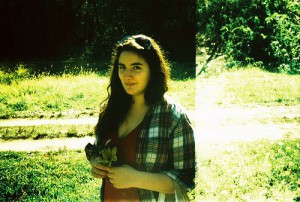Hands-on and Head-first into History: Interview with YIVO Archives Intern Lana Adler
 YIVO archives intern Lana Adler
YIVO archives intern Lana AdlerLana Adler, a recent graduate of Hampshire College, is assisting Acquisitions Archivist Leo Greenbaum in the YIVO Archives. Editor Roberta Newman interviewed her recently about her experiences as an intern.
RN: Can you tell us what you’re working on right now, Lana?
LA: Right now, I’m going through items that have been recently donated to the YIVO Archives. These include unpublished memoirs, family histories, letters, various types of documents, photographs, and pamphlets. They’re extremely varied and super interesting. I’m making a definitive list for publication in Yedies and also picking out things that might be of particular interest for special features.
I’m a huge historical voyeur! I really enjoy these basic pieces of people’s lives, such as letters talking about pretty mundane things. It might not seem important because it’s just one person, but to me it’s really cool. It gives me a chance to commune with that person a little bit. I also really like looking at historical documents, which are pieces of time that has passed.
RN: What is your educational background?
LA: I went to an Orthodox Jewish school through elementary and high school that had its own specifically Hebraist, Zionist version of what Jewish history should be and what the Jewish present should be, which is very intricately tied to that. But they didn’t really address Eastern European history that wasn’t the Holocaust. It was more about ancient Jews in Palestine; then medieval times happened, and then the Holocaust, and then Israel. And I never really encountered anything about Eastern European history aside from the fact that it was bad and dour and led to the Holocaust.
Then I went to college and I started studying Yiddishists and the extremely rich cultural life of Eastern European Jews and Diaspora Jews in general. And it completely changed the way I looked at things. People are so complicated. It was eye-opening to see that the monolithic history that I had been presented with was in fact one itty-bitty part of a much larger, much more diverse experience.
My undergraduate thesis was on narrative non-fiction but I did a couple of pieces on the history of the Hebrew language and on the conflict between Yiddishists and Hebraists and the role of language in the construction of Jewish culture and identity. This also drew from my own experiences, as I began thinking about the reasons why I myself, whose relatives, from my grandparents on backward, spoke Yiddish, never learned Yiddish. And why I, in fact, learned Hebrew and a version of Hebrew that was for all intents and purposes invented around a hundred years ago, give or take. So I was exploring those questions especially in terms of what we value and what we communicate when we pick a national language, as well as what it means for Jews to have a national language.
RN: Has working with original documents given you a new perspective on Jewish history and the topics you wrote about in college?
LA: The history that reveals itself through people’s words and documents is extremely textured. There are as many narratives as there are people. It expands the way that I look at history.
Think about the way that history is taught to us in elementary school and high school, and sometimes even in college, depending on where you go! It’s presented as an incredibly singular, linear event. If there are opposing sides in a conflict it’s like “this guy thinks this and this guy thinks that,” and that’s it. There’s very little nuance. When, in fact, if you look at the world today, you can’t say, “This is the one thing that the world is doing.” When you see voices from a similar time coming at things from such astronomically different ways, you realize that they were living in the same world but that they were also living in very different versions of the same world and their experiences were very different. And so their “history” is very different.
It’s really an experience to be able to get hands-on, head-first into history. When I was working on my thesis I was entirely working from a theoretical standpoint and also from primary documents that were photocopied or had been scanned. But to be able to really touch things – it’s way more important than you would think.
This interview has been edited for length and clarity.




